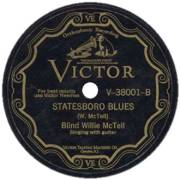
The Allman Brothers Band was an American rock band formed in Jacksonville, Florida in 1969 by brothers Duane Allman and Gregg Allman, as well as Dickey Betts, Berry Oakley (bass), Butch Trucks (drums), and Jai Johanny "Jaimoe" Johanson (drums). Subsequently based in Macon, Georgia, they incorporated elements of blues, jazz and country music and their live shows featured jam band-style improvisation and instrumentals.
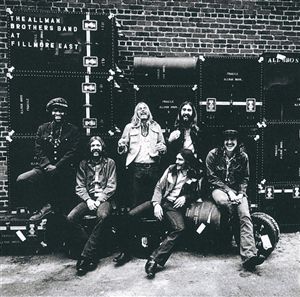
At Fillmore East is the first live album by American rock band the Allman Brothers Band, and their third release overall. Produced by Tom Dowd, the album was released on July 6, 1971, in the United States by Capricorn Records. As the title indicates, the recording took place at the New York City music venue Fillmore East, which was run by concert promoter Bill Graham. It was recorded over the course of three nights in March 1971 and features the band performing extended jam versions of songs such as "Whipping Post", "You Don't Love Me" and "In Memory of Elizabeth Reed". When first commercially released, it was issued as a double LP with just seven songs across four vinyl sides.

Howard Duane Allman was an American rock and blues guitarist and the founder and original leader of the Allman Brothers Band, for which he was inducted into the Rock and Roll Hall of Fame in 1995.

Coricidin, Coricidin 'D' (decongestant), or Coricidin HBP, is the name of an over-the-counter cough and cold drug containing dextromethorphan and chlorpheniramine maleate. Introduced by Schering-Plough in 1949 as one of the first antihistamines, it is now owned by Bayer. Varieties of Coricidin may also contain acetaminophen and guaifenesin.
"In Memory of Elizabeth Reed" is an instrumental composition by the American group The Allman Brothers Band. It first appeared on their second studio album, Idlewild South (1970), released on Capricorn Records. The jazz-influenced piece was written by guitarist Dickey Betts, among his first writing credits for the group. Betts named it after a headstone he saw for Elizabeth Jones Reed Napier in Rose Hill Cemetery in the band's hometown of Macon, Georgia. Multiple versions of the composition have been recorded, with the version performed on the group's 1971 live album At Fillmore East generally considered the definitive rendition.

The Road Goes On Forever was The Allman Brothers Band's first compilation album, a two-LP set released in 1975. It featured songs from the Allmans' first five albums. In 2001, an expanded edition was released featuring 13 more tracks. The album's title is a line from "Midnight Rider."
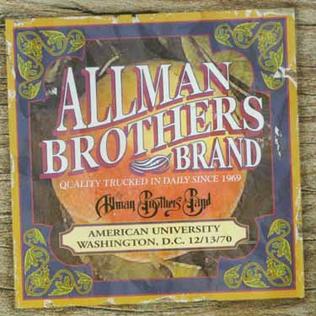
American University 12/13/70 is a live album by the Allman Brothers Band. The first of a series of archival concert recordings from the Allman Brothers Band Recording Company, it features the group's original lineup. It was released in April 2002.

Live at the Atlanta International Pop Festival: July 3 & 5, 1970 is a two-CD live album by the Allman Brothers Band. It features their two performances at the 1970 Atlanta International Pop Festival, at the Middle Georgia Raceway in Byron, Georgia. It was released in 2003.

S.U.N.Y. at Stonybrook: Stonybrook, NY 9/19/71 is a two-CD live album by the Allman Brothers Band. The second of a series of archival concert albums from the Allman Brothers Band Recording Company, it features the original lineup of the group. It was released in 2003.
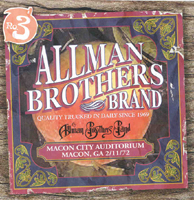
Macon City Auditorium: Macon, GA 2/11/72 is a two-CD live album by the Allman Brothers Band. It was recorded at the Macon City Auditorium in Macon, Georgia on February 11, 1972. The third archival concert album from the Allman Brothers Band Recording Company, it was released in 2004.

Nassau Coliseum: Uniondale, NY: 5/1/73 is a two-CD live album by the Allman Brothers Band. It was recorded at Nassau Coliseum in Uniondale, New York on May 1, 1973. The fourth archival concert release from the Allman Brothers Band Recording Company, it features the 1972 to 1976 lineup of the band – Gregg Allman, Dickey Betts, Chuck Leavell (piano), Lamar Williams (bass), Jaimoe (drums), and Butch Trucks (drums). It was released in 2005.
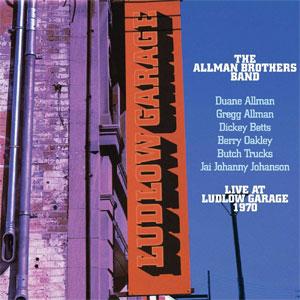
Live at Ludlow Garage: 1970 is an album by the Allman Brothers Band. It was recorded live at Ludlow Garage in Cincinnati on April 11, 1970. It was released by Polydor Records on April 20, 1990.

Gold is a two-CD compilation album by the Allman Brothers Band. It contains songs selected from their first eight albums, which were released by Capricorn Records — The Allman Brothers Band (1969), Idlewild South (1970), At Fillmore East (1971), Eat a Peach (1972), Brothers and Sisters (1973), Win, Lose or Draw (1975), Wipe the Windows, Check the Oil, Dollar Gas (1976), and Enlightened Rogues (1979). It was released by Island Records on October 11, 2005. It is a reissue of the 2001 expanded compilation The Road Goes On Forever: A Collection of Their Greatest Recordings.

Boston Common, 8/17/71 is a live album by the rock group the Allman Brothers Band. As the name suggests, it was recorded at Boston Common in Boston, Massachusetts, on August 17, 1971. It is the fifth archival release by the Allman Brothers Band Recording Company, and the third one to feature the original lineup of the band. It was released in 2007, and re-released in 2014.
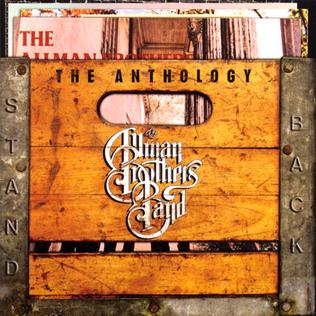
Stand Back: The Anthology is a compilation album by the Allman Brothers Band, released in 2004. It is the only retrospective which is cross-licensed among the different record labels for all of the band's studio recordings from its debut in 1969 through 2003.

Live from A&R Studios is an album by the Allman Brothers Band. It was recorded on August 26, 1971, at A&R Studios in New York City for a live radio broadcast. It was released on April 1, 2016.

Down in Texas '71 is a live album by the Allman Brothers Band. It was recorded on September 28, 1971 at the Austin Municipal Auditorium in Austin, Texas. It was released on March 26, 2021.
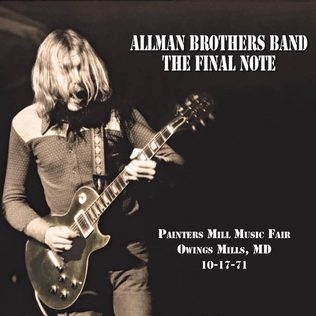
The Final Note is a live album by the Allman Brothers Band. It was recorded on October 17, 1971 at the Painters Mill Music Fair in Owings Mills, Maryland. It was released on October 16, 2020.
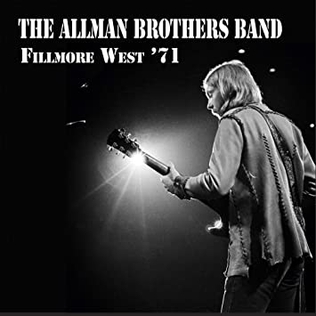
Fillmore West '71 is a four-CD live album by the Allman Brothers Band. It was recorded January 29 – January 31, 1971, at the Fillmore West in San Francisco. It was released on September 6, 2019.

Syria Mosque is a live album by the American rock band the Allman Brothers Band. It was recorded on January 17, 1971, at the Syria Mosque in Pittsburgh, Pennsylvania. It was released for streaming and downloading on October 28, 2022, and was released on CD on December 16, 2022. It was released as a two-disc LP on April 22, 2023.
